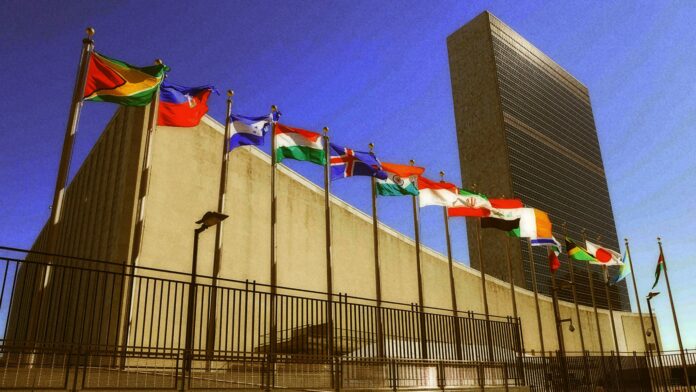The United Nations, it has long been known, is not a safe space for Israel. Thirty-two nations within the UN do not recognise Israel as a legitimate state and with many others joining the disproportionate criticism, it falls to the few democratic nations around the table to stand up to the bullies.
Unfortunately, New Zealand rather than finding an independent voice at the United Nations over the past year has chosen to follow the anti-Israel mob.
Following UNSC Resolution 2334, there were 19 resolutions that singled Israel out for condemnation in the General Assembly (and one more expected before the end of the year). UN Watch has compiled a list of the resolutions with commentary on their site. There were only 6 other resolutions that specifically singled out a nation and no country was targeted more than once except for Israel.
Most, if not all of the 19 anti-Israel resolutions were sponsored by a combination of Organisation of Islamic Cooperation countries with shocking human rights records. New Zealand voted to support 16 of the 19 and abstained in the remaining 3. In contrast, Australia voted no to 6 of the resolutions, Canada voted no to 17 (they also abstained on the other 2), and the United States voted the same as Canada.
The resolutions included one similar to previous UNESCO proclamations which omitted the name “Temple Mount” for the holiest site in Judaism and only used the Muslim term, “Haram al-Sharif, denying a Jewish link to Jerusalem. There was also a resolution calling on Israel to give land to Syria.
Institutional bias towards Israel at the UN is well known.
Ban Ki-moon used his final speech as Secretary General at the UN Security Council to admit the organisation’s bias against Israel. He said
Decades of political maneuverings have created a disproportionate volume of resolutions, reports and conferences criticizing Israel. In many cases, rather than helping the Palestinian cause, this reality has hampered the ability of the UN to fulfill its role effectively.”Ban Ki-moon
Further, a recent report by a group of twenty-four international law experts and academics facilitated by The Hague Initiative for International Cooperation (thinc) and the International Conference for Truth, Justice, and Peace (ICTIP) showed that UNSC Resolution 2334 “fell short of an open, balanced, and thorough consideration of all the relevant factual and legal issues (which) resulted in legal findings that did not adequately take into account the legal, historical, political and military complexities of these territories and peoples.”
The report clearly shows the highly discriminatory nature of the resolution.
Many questions were raised after New Zealand’s role in the passing of UNSC Resolution 2334, especially with regard to process. Those questions remain. Who makes the decision regarding New Zealand’s vote at the U.N. on Israel? Is it the diplomat, the Ministry of Foreign Affairs, the Foreign Minister, or the Prime Minister?
Is New Zealand going to continue its unquestioning support of discriminatory actions against its ally, Israel, or will it seek to be an honest broker of peace and a fair nation who considers the evidence in an unbiased way? We would hope that New Zealand’s vote on the international stage would be cast in a more considered fashion, such that we would truly uphold the traditional “fair go” of which we boast.
[FBcomments]




[…] and disproportionate resolutions against Israel are nothing new at the United Nations. However, the United States introduced an amendment to the resolution to try and provide some […]
[…] and disproportionate resolutions against Israel are nothing new at the United Nations. However, the United States introduced an amendment to the resolution to try and provide some […]
[…] against the one democratic nation that upholds liberal values in the Middle East. In 2017, New Zealand voted to support 16 of 19 anti-Israel resolutions at the General Assembly and abstained in the remaining 3. In contrast, Australia voted no to 6 of […]
[…] 2017, New Zealand voted to support 16 of 19 anti-Israel resolutions at the General Assembly and abstained in the remaining […]
[…] against any of the other anti-Israel practices at the United Nations – rather, New Zealand voted in favour of more anti-Israel resolutions in 2017 than traditional allies like Australia, Canada, and the United States. Some clear recent examples of anti-Israel bias that […]
[…] has claimed.Unfortunately, UN resolutions build upon each other and 2334 was referenced in the disproportionate number of anti-Israel resolutions that New Zealand continued to support in 2017, and in the recent resolution condemning Israel for “disproportionate and indiscriminate […]
[…] at a time when New Zealand’s record of voting at the UN has been out of step with our traditional allies, including naming only Israel for condemnation over the recent violence in Gaza. MFAT officials are […]
[…] reason the latter shouldn’t be surprising is because of the disproportionate number of resolutions against Israel at the UN and the Security Council is no different – the Security Council can’t even bring […]
[…] on United Nation votes and public comments to do with Foreign Affairs. We have already shown how New Zealand’s UN voting record has been anti-Israel for some years and called the government out for not condemning Palestinian […]
[…] that there are disproportionately more resolutions passed against Israel than any other country (by a ratio of 20:1) when countries like Yemen, Saudi Arabia, Iran, North Korea, and Venezuela dictate the […]
[…] New Zealand representatives have once again continued their bias against Israel by voting in the most recent tranche of seven resolutions, singling out Israel – no other […]
Comments are closed.